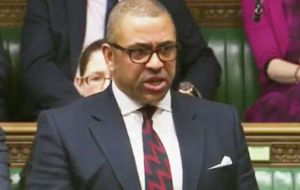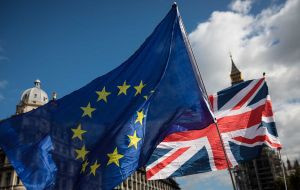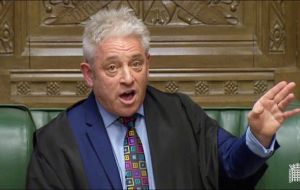MercoPress. South Atlantic News Agency
Following Parliament Brexit deadlock, Mrs. May deal is back for a third attempt
 Mrs May told her Conservative lawmakers she would step down if her Brexit deal was finally passed by Parliament at the third attempt
Mrs May told her Conservative lawmakers she would step down if her Brexit deal was finally passed by Parliament at the third attempt  “In a spectacular display of indecision, Commons has voted against remaining in the EU and every version of leaving the EU,” tweeted Mr James Cleverly
“In a spectacular display of indecision, Commons has voted against remaining in the EU and every version of leaving the EU,” tweeted Mr James Cleverly  UK was supposed to leave the bloc on Friday but Brussels agreed last week to put back the divorce date until April 12 to give it a chance to resolve a three-year crisis
UK was supposed to leave the bloc on Friday but Brussels agreed last week to put back the divorce date until April 12 to give it a chance to resolve a three-year crisis  An attempt by Parliament to take control of the process by holding a series of indicative votes on other options produced no immediate way through the impasse.
An attempt by Parliament to take control of the process by holding a series of indicative votes on other options produced no immediate way through the impasse. Efforts to persuade MPs to back Theresa May's Brexit deal will continue on Thursday, a day after she promised to quit as PM if it was approved. Her pledge brought some on-side, such as ex-foreign secretary Boris Johnson.
But challenges remain for the PM after Northern Ireland's DUP, who she relies on for support, said it would not back the deal because of the Irish backstop.
Meanwhile, none of eight alternative Brexit proposals brought by MPs secured backing in a series of Commons votes. The options - which included a customs union with the EU and a referendum on any Brexit deal - were supposed to help find a consensus over how best to leave the EU.
But the failure of any of them to garner support from a majority of MPs led Brexit Secretary Stephen Barclay to say it strengthened ministers' view their deal was “the best option”.
Conservative MP Sir Oliver Letwin, who oversaw the unprecedented process of “indicative votes”, said the lack of a majority for any proposition was “disappointing”.
But he told BBC Radio 4's Today program no “assumptions” should be made about the outcome of further indicative votes, which he believes should take place on Monday if the PM's deal is not approved this week.
“It's very difficult to translate from how people vote the first time, when they don't know how other people are voting, to how they will vote when they can see how other people are voting under new circumstances,” he said.
Ahead of Wednesday's debate, Mrs May told a meeting of Conservative backbenchers she would leave office earlier than planned if it guaranteed Parliament's backing for her withdrawal agreement with the EU.
Mrs May told her MPs: “I have heard very clearly the mood of the parliamentary party. I know there is a desire for a new approach - and new leadership - in the second phase of the Brexit negotiations - and I won't stand in the way of that.”
She told MPs she would resign as party leader after 22 May - the new Brexit date - but stay on as PM until a new leader is elected. However, Downing Street said it would be a “different ball game” if the deal was not passed.
Her announcement that she would not lead the talks with Brussels over the future relationship between the UK an EU prompted a number of Tory opponents of her deal to signal their backing.
Prominent Leave supporters such as Mr Johnson and former Tory leader Iain Duncan Smith said they now viewed the deal as the least-worst option.
But Mrs May needs to win over 75 rebels to overturn the 149-vote rejection of her deal on 13 March.
Jacob Rees-Mogg, who chairs the Brexiteer European Research Group (ERG), said he would only support the deal if the 10 MPs of the DUP did so.
“I won't abandon the DUP because I think they are the champions of the Union of the United Kingdom,” he told the BBC.
The DUP's main objection is to the backstop, the “insurance policy” designed to avoid the return of border checkpoints between Northern Ireland and the Republic of Ireland in the event a future trade deal is not agreed.
It argues that the measure would result in Northern Ireland having to abide by different trade rules to the rest of the UK, which leader Arlene Foster says would “damage the Union”.
“The backstop in that Withdrawal Agreement makes it impossible for us to sign up to the agreement,” she told the BBC.
Party colleague Jim Wells said no unionist would ever back Mrs May's withdrawal agreement as it was, since it would leave Northern Ireland “sitting in the waiting room for constitutional change”.
Meanwhile, ERG vice-chairman Steve Baker has suggested he may resign the Conservative whip rather than vote for the deal.
Despite this, Mrs May is thought to be considering a third attempt to get MPs to back the deal, potentially on Friday.
Commons Speaker John Bercow said on Wednesday the process agreed by the House allowed for a second stage of debate on Monday and there was no reason this should not continue.
While it was up to MPs, he said there was an understanding Wednesday's objective was to “shortlist” a number of options before moving on to consider the “most popular”.
Mr Barclay, however, appealed to MPs to back the PM's deal “in the national interest”.
“The House has considered a wide variety of options as a way forward,” he said.
“And it demonstrates there are no easy options here. There is no simple way forward. The deal the government has negotiated is a compromise...That is the nature of complex negotiations.”




Top Comments
Disclaimer & comment rules-

-

-

Read all commentsIt's bloody ridiculous. Pick an option, any option! Just don't leave us all in limbo.
Mar 28th, 2019 - 11:12 am 0Why...?
Mar 28th, 2019 - 11:33 am 0Limbo is a lot of fun...
You just need some dexterity....
https://m.youtube.com/watch?v=Sfkl4Bxl3vY
Chuckle..., chuckle..., requetecontrachuckle...
Sorry Twinkle, Gove will have it and we will be out, and The Falkland Islands remain British. Ha Ha Ha!
Mar 28th, 2019 - 04:25 pm 0Commenting for this story is now closed.
If you have a Facebook account, become a fan and comment on our Facebook Page!